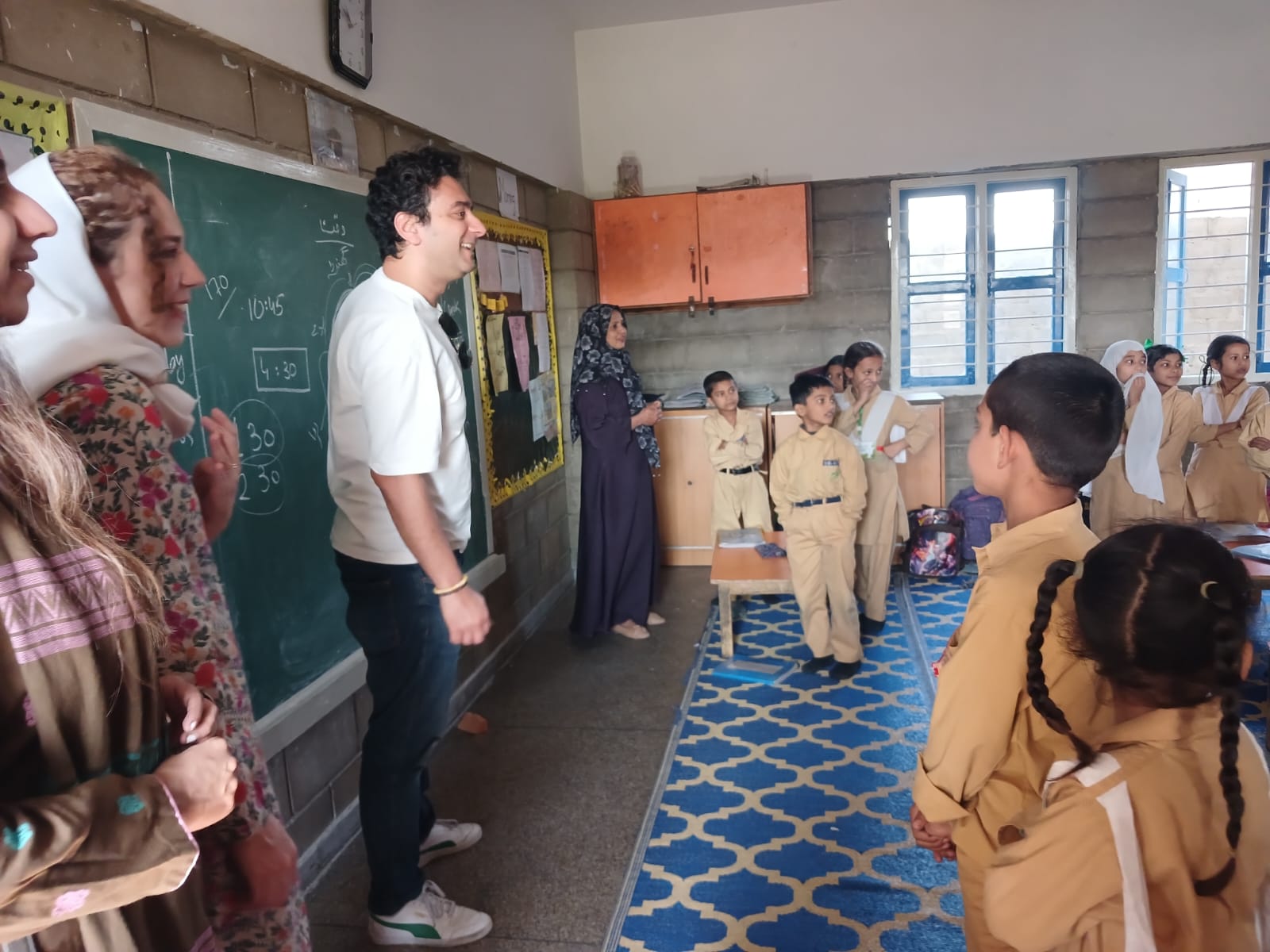Through the lens of a TCF global volunteer who visited one of The Citizens Foundation’s (TCF) schools in Machar Colony—one of Karachi’s most underserved neighbourhoods—discover how education is transforming lives. From narrow alleyways lined with hardship to a school brimming with dreams, this inspiring journey of resilience and hope has been shared by Shehrazade Zafar.
The children of Machar Colony lead two different lives. At six in the morning, they head to the port to clean and peel freshly caught shrimp before it is sold, a job for which their small hands are considered ideal. After that, those enrolled in school attend their classes, while others loiter in the streets, becoming easy targets for trafficking or recruitment by local gangs. In this urban slum, where fishing is the primary source of livelihood, childhood seems to be an elusive concept.
Amidst the open sewers and unpaved roads, the brightly painted TCF school buildings stand out like lighthouses over a sea of rooftops, symbolising hope for a neglected community. The interiors of these schools provide a stark contrast to the surrounding slum, featuring clean bathrooms with running water, a playground and garden, as well as potted plants and colourful posters in every corner.
Establishing these schools was no easy task. Principals and teachers went door-to-door, campaigning for TCF and convincing parents to enrol their children. Initially, many parents in Machar Colony were reluctant—some hesitant to send their daughters to school at all, while others were concerned about their sons sacrificing time that could be spent supporting their families. Over time, however, they developed a trusting relationship with the school staff, who have become confidantes and support systems for families, particularly mothers dealing with widowhood, domestic violence, or health issues resulting from working with raw seafood.
TCF has become an integral part of the community, playing a vital role in uplifting and developing it. Its impact extends beyond the classroom, as students are taught hygiene and manners. One notable observation was how students neatly lined up their shoes and backpacks along the walls. Additionally, TCF provides students with clean uniforms and stationery while imparting valuable life skills that benefit their households. The foundation also conducts adult learning and literacy classes in homes throughout the colony, with a particular focus on empowering women.
Each community in Pakistan presents unique challenges, and TCF has adapted its approach accordingly. As part of its commitment to maintaining a 50/50 gender split across all schools, the foundation employs only female teachers, ensuring that parents have no excuse to prevent their daughters from attending school. In Machar Colony, a language barrier posed a challenge, as many students come from Bengali families with limited proficiency in Urdu and English. TCF ensures religious and ethnic diversity across its schools, fostering an environment of coexistence and tolerance. Retention is another concern, as many older boys eventually drop out to support their families.
The teachers and principals leading these schools—many of whom are TCF alumni themselves, completing a full-circle journey—are more than up to the task. They undergo extensive training and follow a well-structured educational model developed by the foundation, which also publishes its own textbooks based on early education curricula designed by Cambridge and Oxford. The success of this model has enabled TCF to acquire and improve several government schools under the Sindh government’s Adopt-A-School programme.
TCF is dedicated to providing students with a holistic education, one that goes beyond basic literacy and numeracy. Students are encouraged to think critically, cultivate curiosity, and develop independence. They are taught to play and invent their own games without external direction, ask questions, and challenge both themselves and others.
The impact of this approach was evident in the children encountered during the visit. In every classroom, visitors were welcomed with cheerful greetings. The students displayed remarkable confidence, engaging in conversations, reciting poems, and asking thoughtful questions: Where were the visitors from? What were their favourite subjects in school? What had they aspired to be when they grew up, and did they achieve that goal? When prompted by their teachers, the students eagerly shared their own aspirations. Some wanted to become doctors. Others aspired to be teachers, hoping to return and teach at TCF.
The students of TCF exhibit remarkable resilience—perhaps even more than children attending elite private schools—because they understand and appreciate the value of the education they receive. In a place like Machar Colony, access to quality education is rare and invaluable. As the visit concluded, a young boy was seen furiously completing his homework on the sidewalk just outside the school gates, determined to be ready for his afternoon classes.
There are countless success stories of TCF alumni who have gone on to achieve remarkable things, both in Pakistan and abroad. However, the reality remains sobering: only 40% of the children in Machar Colony are enrolled in school. Although TCF operates over thirty schools across Karachi, the majority of children in the city—and across Pakistan—remain out of school. The demand for education continues to grow as families recognise its importance. To meet this demand, TCF requires the necessary funding to build more schools, offering an alternative to fee-paying private schools and low-quality government institutions.
To sustain its mission, TCF relies on the generosity of its donor network within Pakistan, where it has built a strong reputation, and among the Pakistani diaspora, many of whom seek meaningful charitable causes as part of their Zakat commitments. However, there is a crucial need for broader global awareness and support, particularly in countries like Switzerland, which not only have the financial capacity to contribute but also a deep-seated cultural appreciation for education and international development.
In many ways, Machar Colony embodies both the struggles and the potential of Pakistan: the poverty and hardship often associated with the country, but also the hopeful vision of a better future made possible through TCF’s efforts.











